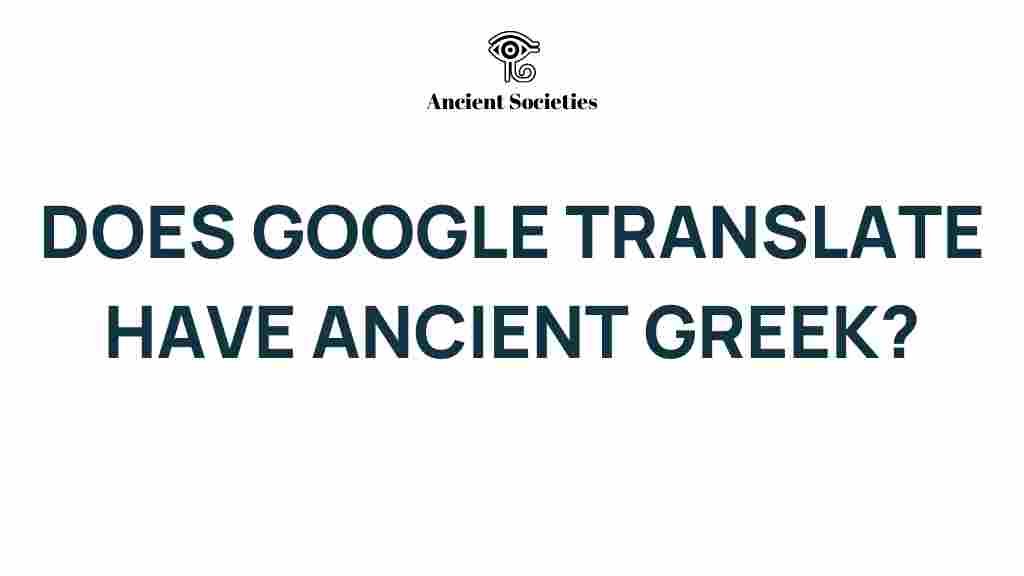Unlocking the Secrets: Does Google Translate Support Ancient Greek?
As the digital age progresses, the demand for effective translation tools continues to grow. Among these tools, Google Translate stands out as a widely used platform for translating a variety of languages. However, when it comes to less commonly spoken languages or ancient tongues, questions often arise regarding the tool’s capabilities. One such language is Ancient Greek. This article delves into whether Google Translate supports Ancient Greek, exploring the implications for language preservation, linguistic history, and the role of digital tools in maintaining our cultural heritage.
The Importance of Ancient Greek
Ancient Greek is more than just a historical language; it is a pillar of Western literature, philosophy, and science. The works of Homer, Plato, and Aristotle, among others, have shaped our understanding of numerous subjects. As a result, preserving this language is crucial for maintaining access to foundational texts that continue to influence modern thought.
How to Check Google Translate for Ancient Greek Support
Before we dive into the specifics of Google Translate’s capabilities, let’s look at how you can check if it supports Ancient Greek.
Step 1: Access Google Translate
Open your web browser and navigate to the Google Translate website. You can also download the mobile app for iOS or Android to have translation capabilities at your fingertips.
Step 2: Language Selection
In the language selection menu on the left side of the interface, click on the dropdown menu to view the list of supported languages. You can scroll through or type in the search bar to find the language you need.
Step 3: Look for Ancient Greek
Unfortunately, as of the latest updates, Google Translate does not support Ancient Greek. The closest supported language is Modern Greek. While Modern Greek shares many roots with Ancient Greek, the two languages have evolved significantly over time, leading to differences in syntax, vocabulary, and usage.
Step 4: Explore Alternatives
If you are looking to translate Ancient Greek texts, consider the following alternatives:
- Specialized Translation Services: Look for professionals or services that specialize in classical languages.
- Academic Institutions: Many universities offer resources or assistance in translating Ancient Greek.
- Online Forums: Websites like Reddit or dedicated linguistic forums can provide insights from fellow enthusiasts.
- Language Learning Apps: Some apps focus on teaching Ancient Greek, which can aid in understanding the language better.
Challenges of Translating Ancient Greek
Translating Ancient Greek presents unique challenges that modern translation technology, such as Google Translate, may not easily overcome. Here are some of the key difficulties:
- Complex Grammar: Ancient Greek grammar is intricate, with various declensions and conjugations that can alter the meaning of words based on context.
- Idiomatic Expressions: Many phrases in Ancient Greek do not have direct equivalents in modern languages, making translation tricky.
- Cultural Context: Understanding the cultural and historical context behind texts is essential for accurate translation.
Significance of Language Preservation
The inability of Google Translate to support Ancient Greek highlights a broader issue in language preservation. As technology evolves, it is crucial to ensure that ancient and endangered languages do not fall into obscurity. Here’s why preserving languages is vital:
- Cultural Identity: Languages are a fundamental part of cultural identity. They carry histories, traditions, and values.
- Historical Knowledge: Many ancient texts provide insight into past civilizations, philosophies, and sciences.
- Diversity: Maintaining linguistic diversity enriches our global society and fosters understanding among different cultures.
The Role of Digital Tools in Language Preservation
Even though Google Translate does not support Ancient Greek, other digital tools are being developed to promote language preservation. Here are some significant advancements:
- Online Dictionaries and Databases: Websites dedicated to Ancient Greek provide extensive resources, including lexicons and grammatical guides.
- Language Learning Platforms: Tools like Duolingo or Memrise are expanding their offerings to include ancient languages, making learning more accessible.
- Digital Libraries: Projects like the Perseus Digital Library offer access to a wealth of Ancient Greek texts, supporting both academic research and casual interest.
Exploring Linguistic History
Understanding the evolution of languages is essential for linguists and enthusiasts alike. Ancient Greek is a remarkable example of how languages develop over time:
- Dialects: Ancient Greek had several dialects, such as Ionic, Doric, and Aeolic, each with unique features.
- Influence on Modern Languages: Many words in modern languages, particularly in scientific and philosophical contexts, have their roots in Ancient Greek.
- Language Families: Ancient Greek belongs to the Hellenic branch of the Indo-European language family, showcasing its connections to other languages.
Troubleshooting Tips for Using Google Translate
If you encounter issues while using Google Translate for supported languages, here are some troubleshooting tips:
- Check Your Internet Connection: A stable connection is essential for the service to function correctly.
- Clear Cache and Cookies: Sometimes, browser issues can be resolved by clearing cache and cookies.
- Use Simple Language: Avoid complex sentences or idiomatic expressions to get more accurate translations.
- Update Your App: If using the mobile app, ensure it’s updated to the latest version for optimal performance.
Conclusion
In conclusion, while Google Translate does not currently support Ancient Greek, the importance of this language and its role in our linguistic history cannot be overstated. The challenges of translating Ancient Greek highlight the need for specialized knowledge and resources. As we embrace digital tools for language preservation, it is essential to continue supporting efforts that protect our cultural heritage. By understanding the limitations of current technology, we can also appreciate the rich tapestry of human language and its history.
For more information on language preservation efforts, check out this external resource. You might also find interest in our article on the evolution of translation technology here.
This article is in the category Technology and created by AncientSocieties Team
